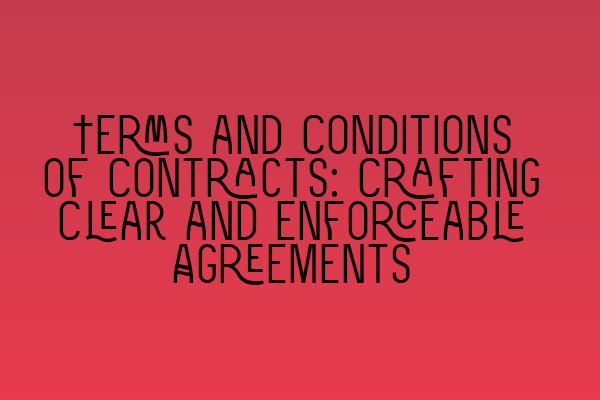Terms and Conditions of Contracts: Crafting Clear and Enforceable Agreements
As a solicitor, one of the most important tasks is to draft terms and conditions of contracts that are both clear and enforceable. The terms and conditions serve as the foundation of any contract, outlining the rights and obligations of the parties involved. Crafting these agreements requires careful consideration of various legal factors and attention to detail. In this blog post, we will explore the key aspects of creating terms and conditions that are effective in protecting your client’s interests.
1. Understanding the Purpose of Terms and Conditions
Before delving into the intricacies of contract drafting, it’s essential to understand the purpose of terms and conditions. These provisions are meant to govern the relationship between parties and define the terms on which they agree to do business. They establish the rights and obligations of each party, outline the scope of work, allocate risks, and provide a mechanism for dispute resolution. Clear and enforceable terms and conditions are vital for protecting your client’s interests and preventing potential disputes.
2. Tailoring Terms and Conditions to Fit the Specific Contract
Each contract is unique, and therefore, the terms and conditions should be tailored to fit the specific circumstances. This customization ensures that the provisions accurately reflect the intentions of the parties and protect their respective rights. When drafting terms and conditions, it’s crucial to consider factors such as the nature of the agreement, industry-specific regulations, and potential risks involved. By taking these elements into account, you can create a robust and comprehensive contract that addresses all relevant issues.
3. Ensuring Clarity and Simplicity
Ambiguity in contractual terms can lead to misunderstandings and disputes. To avoid such situations, it’s imperative to ensure clarity and simplicity in the wording of the provisions. Using plain, straightforward language helps in clearly conveying the rights and obligations of each party. Avoiding legal jargon and complicated phrases is crucial to ensure that all parties involved can easily understand the terms of the agreement. This not only facilitates smooth business transactions but also strengthens the enforceability of the contract.
4. Including Essential Elements
There are certain essential elements that should be included in every contract to make it legally enforceable. These elements include an offer, acceptance, consideration, legal capacity of the parties, and a mutual intent to be bound by the terms. Failure to include any of these elements may render the contract void or unenforceable. Additionally, specific clauses such as termination, indemnity, limitation of liability, and dispute resolution should be carefully included to protect the interests of your client.
5. Addressing Potential Risks and Mitigation Strategies
Contracts are often drafted to anticipate and mitigate risks. It’s essential to identify the potential risks associated with the specific contract and address them within the terms and conditions. This may involve including clauses related to insurance requirements, warranties, limitation of liability, and dispute resolution mechanisms. By adequately addressing potential risks, you can protect your client from potential harm and minimize the likelihood of costly disputes in the future.
6. Seeking Legal Expertise
Crafting clear and enforceable terms and conditions requires legal expertise. As a solicitor, it’s crucial to collaborate with your client to gain a comprehensive understanding of their needs and objectives. By having in-depth discussions and obtaining all relevant information, you can skillfully draft a contract that aligns with your client’s expectations while providing robust legal protection. Seeking the guidance and expertise of a contract law specialist can further enhance the quality and effectiveness of the terms and conditions you draft.
In conclusion, crafting clear and enforceable terms and conditions is a crucial task for solicitors. By understanding the purpose of these provisions, tailoring them to fit the specific contract, ensuring clarity and simplicity, including essential elements, addressing potential risks, and seeking legal expertise, you can create contracts that protect your client’s interests and prevent disputes. Remember, a well-drafted contract paves the way for successful business relationships.
For more information and resources on SQE contract law preparation and practice, visit our related articles:
– SQE 1 Practice Exam Questions
– SQE 1 Practice Mocks FLK1 FLK2
– SQE 2 Preparation Courses
– SQE 1 Preparation Courses
– SRA SQE Exam Dates
